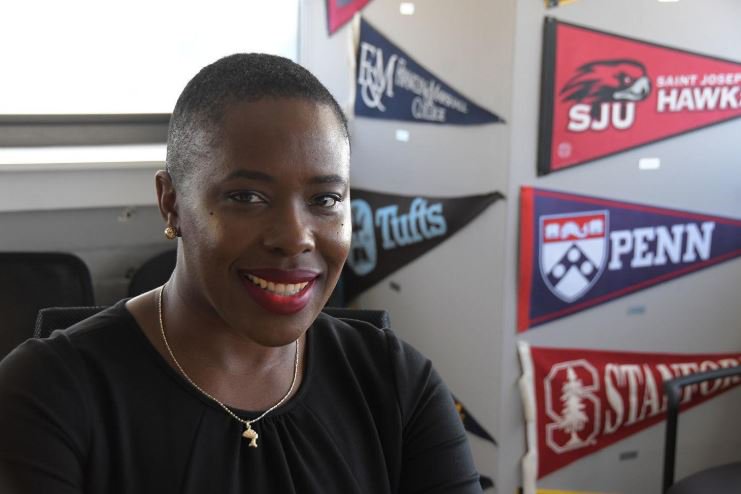
Jessica Cunningham Akoto took the lead at KIPP Philadelphia schools earlier this year.
Years ago, when a news story aired on “60 Minutes” about KIPP(Knowledge is Power Program) Public Charter Schools, they garnered national attention.
And Jessica Cunningham Akoto’s mother was one of the people watching.
“She literally harassed me every year, ‘Why don’t you at least check it out?’” said Cunningham Akoto, who was named the executive director of KIPP Philadelphia Public Schools earlier this year. “She found the model intriguing based on what she saw in that one special.”
That was 18 years ago and KIPP had only two schools at the time. Now it has 224 schools across the country, including six in Philadelphia — three elementary schools, two middle schools and one high school that serve a total of 2,200 students.
Cunningham Akoto gave in to her mother and started teaching at a KIPP school in the District of Columbia about 16 years ago.
“It’s been so rewarding to see Jessica grow from a classroom leader at KEY Academy to CEO of KIPP Philadelphia,” said Susan Schaeffler, CEO and founder of KIPP D.C., in an email to the Tribune. “Since I hired her to be a sixth-grade math teacher for KIPP D.C. nearly 20 years ago, her fierce dedication to educational equity and excellence has only grown. At her core, she is a tireless advocate. An advocate for students, her staff and her community. She’s pushed me to be a better leader and always kept us grounded in the potential of our students.”
First resistant to a career in education, Cunningham Akoto earned a degree in African studies from Florida A&M University and a master’s degree in elementary education and teaching from American University. She interned at a lobbying firm before she became a teacher and worked in D.C. public schools. When she took a job at a KIPP school, she never looked back.
“Initially, leadership chose me and then I chose leadership,” Cunningham Akoto said. “I became really disturbed and dismayed by the lack of diversity at the senior-most levels in the charter movement and in the education reform sector.”
Cunningham Akoto had grown up in Prince George’s County, Maryland. Her mother was a teacher in schools in D.C. and many of her mother’s friends were teachers and administrators. She was accustomed to “Black women running the show.”
“We had Black women superintendents and Black principals,” Cunningham Akoto said. “It was sort of astonishing to me now to be working in public education myself and to see the people who were dictating how and what our children would learn looked nothing like them [and] came from communities dissimilar to theirs. Once I became more of an experienced school leader, I became more passionate about making sure that all voices were heard and had more of a seat at the table around what happens at our schools.”
Cunningham Akoto attended traditional public schools, private Montessori and a Catholic high school. Her parents took advantage of school choice and Cunningham Akoto believes it should be a right afforded to all families, not just to those in the middle or upper class.
“I have to acknowledge that I am a step-parent but I have never raised a child from birth and had to make those difficult decisions for myself,” Cunningham Akoto added. “But I do know what it’s like to be dissatisfied with your child’s school options and be forced with really tough decisions. I think sometimes from what I’ve heard from parents that I’ve worked with is that sometimes they become frustrated with systems and structures that don’t seem to work for their particular child and they then start looking at other options that they find more appealing or interesting.”
Cunningham Akoto said in many cases KIPP schools outperform other similar schools, but they’re not satisfied with that. For example, at KIPP DuBois Charter School, Keystone Exam tests lagged during the 2016-17 school year, according to its School Progress Report. At KIPP West Philadelphia Preparatory Charter School, the PSSA test scores were also behind in the 2016-17 school year, but they did make progress in mathematics and English language arts.
“We think that our kids are just as smart as kids who go to private schools, as kids who go to schools that have top-tier performance,” Cunningham Akoto said. “We need to get better and get more surgical about the best ways to teach them and empower them to implement those skills so they can show that skill mastery and show that proficiency when it comes time for state exams and for the ACT most importantly.”
Approximately 97 percent of the students in the six KIPP Philadelphia schools are African American, and most are first-generation college-goers and graduates.
Five of the KIPP Philadelphia schools are led by women, and four of those women are Black. More than 50 percent of the other staff members are people of color.
“That is very unique I think in the education sector,” Cunningham Akoto said. “It’s certainly unique in the charter world and in KIPP. I’m really proud that we’ve done that in Philadelphia.”
rpersinger@phillytrib.com (215) 893-5724